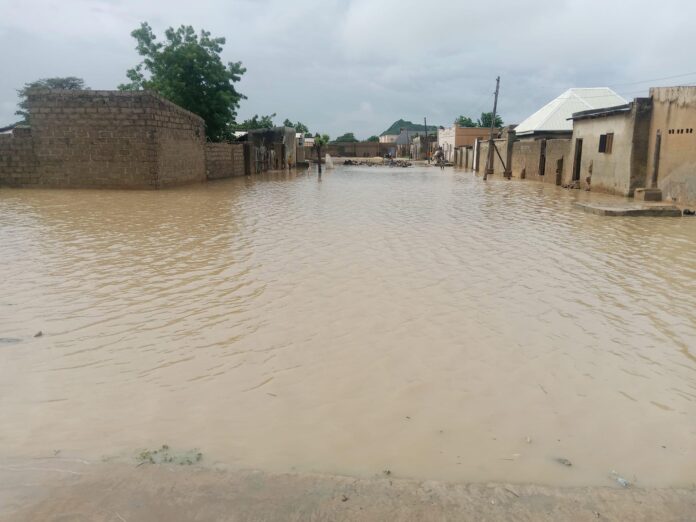The Federal Government has expressed deep sympathy for the people of Borno State after a devastating flood wreaked havoc on the state. The flooding, which hit Maiduguri and surrounding areas, destroyed homes, farmlands, and key infrastructure, leaving thousands displaced.
In a press statement, the Minister of Water Resources and Sanitation, Mr. Samuel Anyanwu, revealed that the flood, caused by an overflow from the Alau Dam, impacted millions of Nigerians. The Alau Dam, located just 10 kilometers from Maiduguri, experienced a significant inflow from the Ngadda River, a major tributary of River Yedzaram, leading to widespread devastation in the Maiduguri and Jere areas.
The minister confirmed that he, along with the Minister of State, Rt. Hon. Bello Mohammad Goronyo, and key officials from various agencies under the Ministry, visited Maiduguri to assess the extent of the damage. During their visit, they met with the Borno State Governor and promised the Federal Government’s full support in addressing the situation.
Anyanwu emphasized that experts from the Ministry, including the National Water Resources Institute (NWRI) and the Nigeria Hydrological Services Agency (NIHSA), have been deployed to the flood zone. They are working in conjunction with the Chad Basin Development Authority to assess the damage to the Alau Dam and make recommendations to prevent future disasters.
The minister warned that, due to the flood, there is a high risk that drinking water could be contaminated, potentially leading to an outbreak of waterborne diseases. “As we try to recover from this disaster, the water we drink may be contaminated. We should be mindful of this, so as to avoid further outbreaks of waterborne and communicable diseases,” Anyanwu cautioned.
Flooding in Nigeria has become an annual menace. This year’s flood scenario was predicted as early as April when the Annual Flood Outlook (AFO) was published by the Nigeria Hydrological Services Agency. Borno was one of 31 states identified as being at high risk for flooding. Other high-risk states included Bauchi, Jigawa, Taraba, Yobe, Benue, and Gombe.
The flooding in Borno is not an isolated incident. Similar disasters have recently occurred in Bauchi, Sokoto, and Kebbi states, where assessments have already been carried out, and action is being taken to provide relief and prevent further damage. The minister stressed that all levels of government must take the early flood warnings seriously to mitigate the damage caused by such disasters.
Despite the devastation in Borno, the situation could worsen in other parts of the country. The Federal Government has issued a red alert for potential flooding on the Niger and Benue rivers. The minister explained that the flow levels in these rivers are increasing significantly and that large volumes of water are moving downstream towards the delta region.
“This warning means that large volumes of water are moving through our rivers down to the delta region. Therefore, we should increase vigilance on all fronts and step up proactive measures to address any eventual flooding events in the southern part of the country,” Anyanwu stated.
The government is taking steps to prevent future flooding and mitigate the effects of disasters. A Presidential Committee on the Development of a Strategic Plan for Preventing Flood Disasters in Nigeria has been set up. This committee, chaired by the Ministry of Water Resources and Sanitation, has already submitted its report.
The committee’s report recommended ten strategic areas of intervention to tackle annual flooding. The report outlined actions to be taken before, during, and after flooding events. It also listed the responsible agencies, expected outcomes, timelines, and costs of implementing the plan.
As part of the Federal Government’s flood prevention strategy, President Bola Tinubu approved the sum of N108 billion to be disbursed to Nigeria’s 36 states. This money will be used to tackle perennial flooding across the country.
In the meantime, the Minister of Water Resources urged state governments and other stakeholders to take heed of the flood early warning systems and put in place measures to minimize the impact on their citizens.
“We implore all sub-national governments and stakeholders to take heed of the flood early warning information from the Ministry and take proactive measures to forestall future flooding. They should also activate response measures to alleviate the suffering of the citizens that have been affected by floods,” the minister urged.

